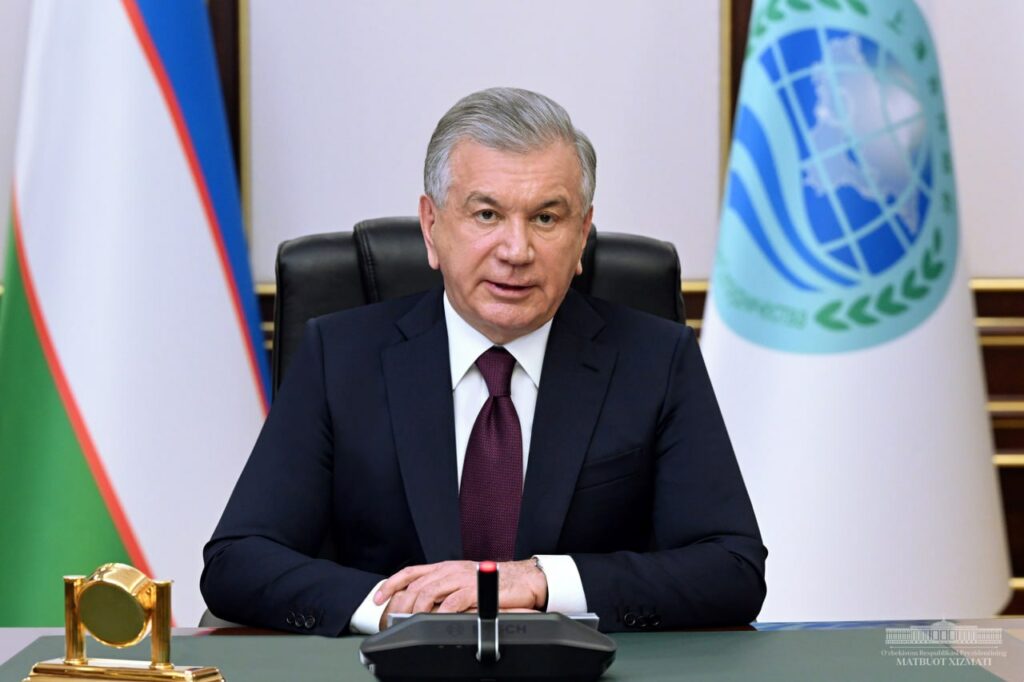Shavkat Mirziyoyev, born on July 24, 1957, is a politician from Uzbekistan. He has been the President of Uzbekistan and the top military commander since December 14, 2016. Before that, he was the Prime Minister from 2003 to 2016.
Shavkat Mirziyoyev, Uzbek President started his political journey in the late 1980s by joining the Communist Party of the Soviet Union. In 1990, he became a member of the Supreme Soviet of the Uzbek SSR. In the mid-1990s, he served as a governor in Jizzakh and Samarqand. Later, he was chosen by then-President Islam Karimov to lead the government.
Unveiling the Political Tapestry
In the intricate weave of Central Asian politics, Shavkat Mirziyoyev emerges as a transformative leader reshaping Uzbekistan’s destiny. Since assuming the presidency in December 2016, he has propelled the nation into a new era of progress and global significance, marking a paradigm shift in political dynamics.
Political Ascendancy: An In-depth Journey
Mirziyoyev’s political journey commenced in the late 1980s with his entry into the Communist Party of the Soviet Union. Elected as a deputy of the Supreme Soviet of the Uzbek SSR in 1990, his administrative prowess was evident as he climbed the ranks, assuming pivotal roles in Jizzakh and Samarqand.
Presidential Tenure: A Vision Unveiled
Taking the helm as Prime Minister in 2003, Mirziyoyev’s vision gained momentum. His formal ascendancy to the presidency in 2016, following President Islam Karimov’s demise, saw him secure a resounding 88.6% mandate in the elections—a testament to his unwavering support among the Uzbek populace.
Reformist Agenda: Pioneering Change
Mirziyoyev’s presidency ushered in a wave of liberal reforms, attracting foreign investment and fostering improved relations with neighboring Central Asian nations. The closure of Jaslyk Prison in 2019 and the release of political prisoners signaled a commitment to human rights, positioning Uzbekistan as a champion of justice.
Constitutional Reforms and Public Support: A Resounding Mandate
In a landmark move in late 2021, Shavkat Mirziyoyev introduced sweeping constitutional reforms, earning overwhelming public support with a 90.6% approval rate in the subsequent 2023 constitutional referendum. This reflects the populace’s endorsement of a progressive and inclusive governance model, solidifying Mirziyoyev’s standing.
Regional Challenges and Resilience: Navigating Turbulence
Facing challenges in 2022, notably unrest in Karakalpakstan, Mirziyoyev’s adept handling and the subsequent scrapping of contentious proposals underscored his commitment to addressing regional concerns with prudence and sensitivity.
Early Life and Academic Brilliance
Mirziyoyev’s roots in the Jizzakh Region shaped his character. Born on July 24, 1957, he graduated from the Tashkent Institute of Irrigation and Melioration in 1981, holding a Ph.D. in Technological Sciences. His early political involvement laid the foundation for a dedicated career in public service.
Diplomatic Acumen: A Global Vision
Mirziyoyev’s diplomatic prowess was evident in his 2006 meeting with Prime Minister Han Myeong-sook of South Korea. Agreements, especially regarding uranium trade, showcased Uzbekistan’s global engagement under Mirziyoyev’s leadership, fostering economic growth and international collaboration.
Human Rights and Economic Renaissance
Despite past criticisms, Mirziyoyev’s commitment to rectifying issues became evident in the 2017 report by Human Rights Watch. His presidency witnessed a shift towards ethical governance, prioritizing human rights and economic development, silencing earlier detractors.
Electoral Mandate: A People’s Choice
In the 2021 elections, Mirziyoyev secured a second term with 80.1% of the vote, reaffirming his popularity and mandate to steer Uzbekistan towards prosperity. This electoral triumph further solidifies his standing as a leader with a broad base of public support.
The Presidential Ascent: Political Finesse at Play
Mirziyoyev’s journey to the presidency, entrenched in political finesse and strategic alliances, reveals his role in organizing President Karimov’s funeral, hinting at his succession. Appointed interim president on September 8, 2016, his subsequent election victory silenced critics, solidifying his position.
Foreign Policy Renaissance: A Global Player
Mirziyoyev’s foreign policy marked a departure from Uzbekistan’s isolationist stance. Improved relations with Kyrgyzstan and Tajikistan, symbolized by his historic visit to Kyrgyzstan in 2017, showcase his commitment to global cooperation. Participation in international forums highlights Uzbekistan’s renewed role on the global stage.
Cultural Revitalization: Embracing the Future
Mirziyoyev’s cultural policies, such as the decree in October 2020 to accelerate the Latinization of the Uzbek language, reflect a forward-looking approach. The roadmap for transitioning to the Latin alphabet demonstrates a commitment to cultural reform and linguistic diversity.
International Acclaim and Ongoing Reforms: A Leader Recognized
Acknowledging Mirziyoyev’s transformative leadership, he was named the “Asian of the Year of 2018” by the Asia Journalist Association. Despite challenges, Mirziyoyev’s ability to navigate complexities and implement reforms positions him as a leader poised for continued success.
Family Ties and Connections: Beyond Politics
Mirziyoyev’s personal and familial life unveils a leader deeply rooted in family values. His marriage to Ziroatkhon Hoshimova and their familial tapestry, coupled with key family members holding significant roles in the government, showcases a harmonious integration of family and professional life.
Luxury Residences: A Glimpse into Leadership
Mirziyoyev’s construction of opulent residences, like the one in Qibray District, reflects his taste for luxury. The exclusive mountain compound, shrouded in grandeur, underscores the scale of his vision for Uzbekistan’s prosperity.
Conclusion: A Visionary’s Legacy
In conclusion, Shavkat Mirziyoyev’s presidency stands as a testament to visionary leadership, marked by substantive reforms, diplomatic achievements, and an unwavering commitment to the well-being of the Uzbek people. As Uzbekistan continues its journey under his guidance, the transformative impact resonates globally, positioning the nation as a beacon of progress in Central Asia.

